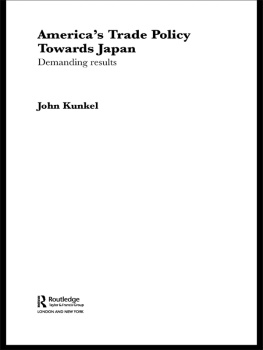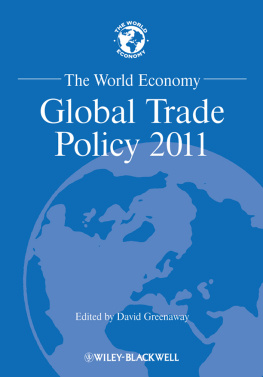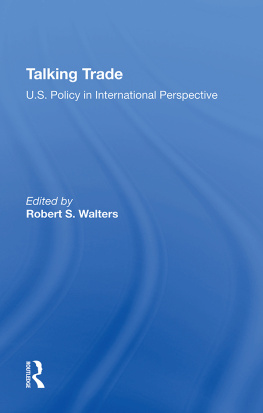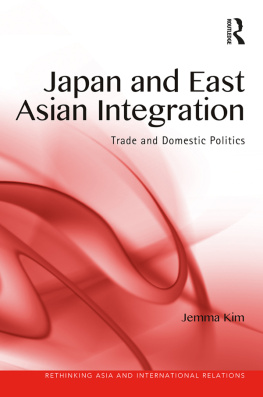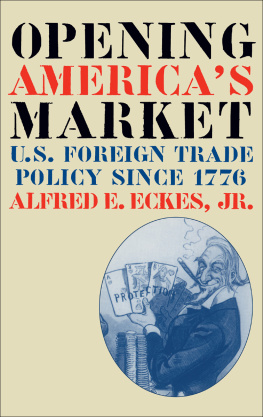John Kunkel - Americas Trade Policy Towards Japan: Demanding Results
Here you can read online John Kunkel - Americas Trade Policy Towards Japan: Demanding Results full text of the book (entire story) in english for free. Download pdf and epub, get meaning, cover and reviews about this ebook. year: 2002, publisher: Routledge, genre: Politics. Description of the work, (preface) as well as reviews are available. Best literature library LitArk.com created for fans of good reading and offers a wide selection of genres:
Romance novel
Science fiction
Adventure
Detective
Science
History
Home and family
Prose
Art
Politics
Computer
Non-fiction
Religion
Business
Children
Humor
Choose a favorite category and find really read worthwhile books. Enjoy immersion in the world of imagination, feel the emotions of the characters or learn something new for yourself, make an fascinating discovery.
- Book:Americas Trade Policy Towards Japan: Demanding Results
- Author:
- Publisher:Routledge
- Genre:
- Year:2002
- Rating:4 / 5
- Favourites:Add to favourites
- Your mark:
- 80
- 1
- 2
- 3
- 4
- 5
Americas Trade Policy Towards Japan: Demanding Results: summary, description and annotation
We offer to read an annotation, description, summary or preface (depends on what the author of the book "Americas Trade Policy Towards Japan: Demanding Results" wrote himself). If you haven't found the necessary information about the book — write in the comments, we will try to find it.
John Kunkel: author's other books
Who wrote Americas Trade Policy Towards Japan: Demanding Results? Find out the surname, the name of the author of the book and a list of all author's works by series.
Americas Trade Policy Towards Japan: Demanding Results — read online for free the complete book (whole text) full work
Below is the text of the book, divided by pages. System saving the place of the last page read, allows you to conveniently read the book "Americas Trade Policy Towards Japan: Demanding Results" online for free, without having to search again every time where you left off. Put a bookmark, and you can go to the page where you finished reading at any time.
Font size:
Interval:
Bookmark:
- The Future of the Nation-State
Essays on cultural pluralism and political integration
Edited by Sverker Gustavsson and Leif Lewin
Co-publication with Nereniusand Santrus Publisher AB, Sweden - Classical Liberalism and International Economic Order
Studies in theory and intellectual history
Razeen Sally - Coping with Globalization
Jeffrey Hart and Aseem Prakash - Responding to Globalization
Jeffrey Hart and Aseem Prakash - Japanese Capitalism is Crisis
A regulationist interpretation
Edited by Robert Boyer and Toshio Yamada - Globalization and Social Change
Edited by Johannes Dragsbaek Schmidt and Jacques Hersh - Multilateralism and the World Trade Organisation
The architecture and extension of international trade recognition
Rorden Wilkinson - Prepared for the 21st Century?
A systematic assessment of the impact of globalization and localization on socio-economic development
Indra de Soysa - Rethinking International Organization:
Deregulation and global goverance
Barbara Emadi-Coffin - Technology, Governance and Political Conflict in International Industries
Tony Porter - Americas Trade Policy Towards Japan
Demanding results
John Kunkel

by Routledge
11 New Fetter Lane, London EC4P 4EE
by Routledge
29 West 35th Street, New York, NY 10001
A catalogue record for this book is available from the British Library
Kunkel, John.
Americas trade policy towards Japan : demanding results / John Kunkel.
p. cm.
Includes bibliographical references and index.
1. United States Foreign economic relations Japan. 2. Japan Foreign economic relations United States. I. Title.
382.0973052dc21 2002068198
ISBN 0415298326 (Print Edition)
Font size:
Interval:
Bookmark:
Similar books «Americas Trade Policy Towards Japan: Demanding Results»
Look at similar books to Americas Trade Policy Towards Japan: Demanding Results. We have selected literature similar in name and meaning in the hope of providing readers with more options to find new, interesting, not yet read works.
Discussion, reviews of the book Americas Trade Policy Towards Japan: Demanding Results and just readers' own opinions. Leave your comments, write what you think about the work, its meaning or the main characters. Specify what exactly you liked and what you didn't like, and why you think so.

